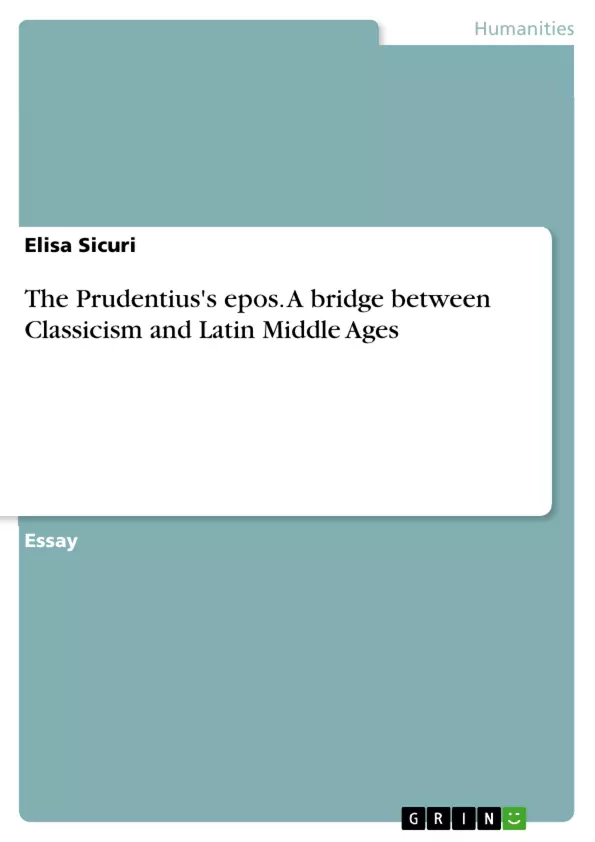This essay deals with the Prudentius’s Epos and tries to link Classicism and Latin Middle Ages.
In the imperial era the epic genre had undergone important modifications to its origins and developed radically with the coming of Christianity. The dissemination of Christ’s message covered all areas of culture and had deep repercussions on literary writing. The idea that literary production should be put to the service of the spread of faith went ahead and this ended up altering the formal features of new works. Unlike the Greek and Latin literature, that generally had an elitist destination, the Christian writers were also aimed to the humblest sections of population until then excluded from the literary communication. The novelties of the new Christian literature (the desire to speak to everyone, the approach to everyday life, the attribution of new importance to simple things) ended up scrapping the traditional set of literary genres, including the epic genre. Almost all literary genres used in Greek and Latin literature were reused by Christian writers, but modified for new needs and new contents.
Inhaltsverzeichnis (Table of Contents)
- THE PRUDENTIUS'S EPOS
- A BRIDGE BETWEEN CLASSICISM AND THE LATIN MIDDLE AGES
- The Evolution of the Epic Genre
- Prudentius and His Influence
- The Hero-Saint Model
- Prudentius's Legacy
Zielsetzung und Themenschwerpunkte (Objectives and Key Themes)
This text examines the work of Prudentius, a Spanish poet and priest who played a pivotal role in the Christianization of the epic genre in Latin literature. The text explores the evolution of the epic genre from its classical roots to its development within the context of early Christianity, highlighting the unique contribution of Prudentius and his impact on the literary landscape of the Middle Ages.
- The evolution of the epic genre from classical to Christian traditions
- Prudentius's influence on medieval epic poetry
- The concept of the hero-saint as a new model in epic literature
- The role of allegory and symbolism in Prudentius's work
- The legacy of Prudentius's work in medieval and vernacular literature
Zusammenfassung der Kapitel (Chapter Summaries)
- The Evolution of the Epic Genre: This chapter examines the transformations of the epic genre during the imperial era, focusing on the impact of Christianity on the genre's development. It explores how the spread of Christianity influenced literary production, leading to a shift from elitist to more accessible writing.
- Prudentius and His Influence: This chapter centers on the life and work of Prudentius, exploring his role in Christianizing the Latin epic. The chapter highlights Prudentius's influence on medieval scholarship and his lasting impact on literary traditions. It analyzes how Prudentius's work was studied and copied throughout the Middle Ages, demonstrating its enduring significance.
- The Hero-Saint Model: This chapter examines the evolution of the epic hero, tracing the development from the classical warrior-hero to the hero-saint model introduced by Prudentius. The chapter delves into the spiritual qualities of Prudentius's characters, analyzing how he infused the epic with Christian themes and ideals.
Schlüsselwörter (Keywords)
The primary focus of this text lies on the intersection of classical epic poetry, Christian literature, and the evolution of the epic genre during the Late Antique and Early Medieval periods. Key terms and concepts include: Prudentius, epic poetry, Christianization of literature, hero-saint model, allegorical epic, Psychomachia, Virtues and Vices, medieval scholarship, and literary influence.
Frequently Asked Questions
Who was Prudentius and why is his work significant?
Prudentius was a Spanish priest and poet who played a key role in Christianizing the Latin epic genre, bridging the gap between Classicism and the Middle Ages.
How did Christianity transform the traditional epic genre?
Christianity shifted the focus of literature from an elitist audience to the masses and modified traditional forms to serve the spread of faith and spiritual ideals.
What is the "hero-saint" model in Prudentius's poetry?
It is a new literary model where the traditional warrior-hero is replaced by a figure defined by spiritual strength, faith, and Christian virtues.
What is the "Psychomachia" and why is it famous?
The Psychomachia is an allegorical epic by Prudentius depicting the battle between Virtues and Vices, which became highly influential in medieval literature and art.
How did Prudentius influence medieval scholarship?
His works were widely studied, copied, and used as models for both Latin and vernacular literature throughout the Middle Ages.
- Quote paper
- Elisa Sicuri (Author), 2017, The Prudentius's epos. A bridge between Classicism and Latin Middle Ages, Munich, GRIN Verlag, https://www.grin.com/document/366607



